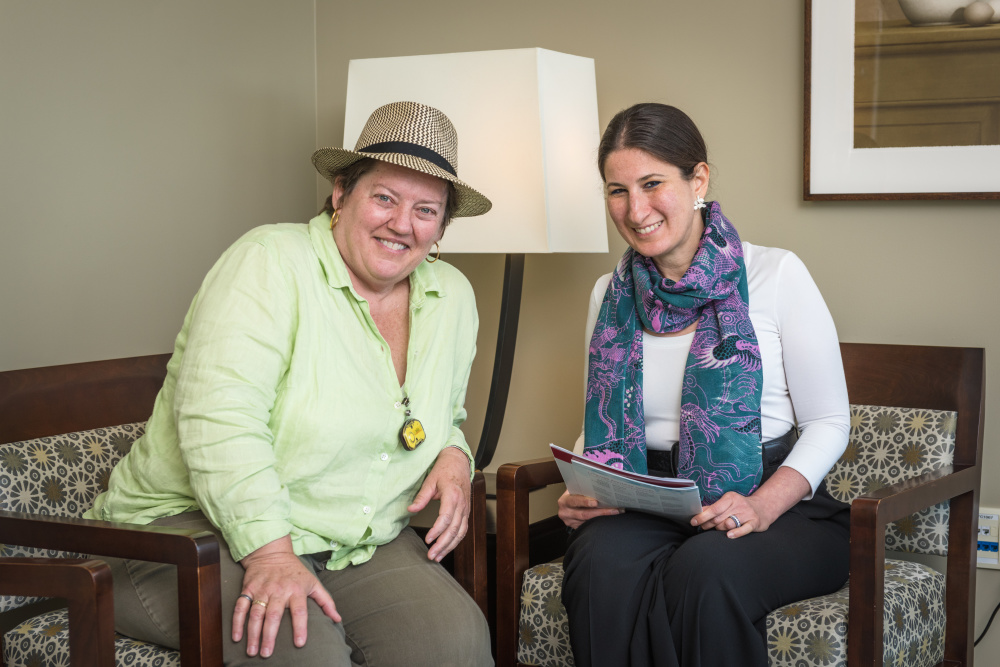
Cancer can feel like a slog — not just a physical one, but an emotional one, too. That’s how 56-year-old business owner Amy Macdonald describes the past year and a half living with metastatic melanoma.
“The biggest changes in my life are the consequences of the treatment – fatigue, body aches, brain fog, and mental issues,” she explains. “I miss my vitality, my curiosity, and my humor; I don’t do nearly as much as before because I’m too tired.”
Macdonald was diagnosed in December 2015 after a friend spotted a dark-colored mole on Macdonald’s temple, by her hairline. She quickly had surgery to remove the tumor, which had spread to her lymph nodes, followed by 12 months on an immunotherapy clinical trial.
One of the expected side effects of the immunotherapy drug was depression, so Macdonald’s oncologist, Elizabeth Buchbinder, MD, prescribed an anti-depressant. But when Macdonald began experiencing distressing side effects from the anti-depressant – including obsessive counting and trouble concentrating – she was referred to Ilana Braun, MD, chief of Adult Psychosocial Oncology at Dana-Farber. Braun found a different drug to treat Macdonald’s side effects without causing additional problems, and addressed her treatment-induced depression through talk therapy.
“It was immediately easy to trust her,” Macdonald says of Braun. “It was great to learn I could do more with her than fix my drug issues – I could talk about life, relationships, work, and everything that gets affected by cancer. She’s the one who treats me as a whole person.”
Due to her treatment side effects, Macdonald says she has been prone to excessive crying, irritation, and emotional meltdowns. And while speaking to friends and other cancer patients has been helpful, meeting with a professional like Braun has been “huge” for her.
Learn More:
“Cancer opens us up to life evaluations and questions about what we want to do with our time here,” Macdonald says. “Ilana has been a real champion for me on that front, helping me figure out what’s important, plan for the future, and communicate that to others.”
Psychosocial oncology providers, led by Braun, guide adult patients through treatment-related stresses, such as anxiety, depression, family and relationship issues, and changes in thinking and behavior, through both talk therapy and medications. They work closely with social workers and palliative care providers in the Psychosocial Oncology and Palliative Care department, as well as the medical oncology care team, to provide comprehensive and coordinated care.
“Sometimes patients can feel so caught up in their medical treatment that focusing on mental health can seem like an afterthought. But keeping up emotional health can be crucial to ensuring patients complete their treatment,” explains Braun, who works with patients from diagnosis through the initial survivorship period. “We’re here to address emotional distress, including depression and anxiety, and make sure patients have the best quality of life during treatment.”
Thanks to expert medical attention from Buchbinder, and whole-person care and encouragement from Braun, Macdonald is on the verge of completing the year-long trial that reduces her risk of recurrence. While she will continue visiting Dana-Farber for scans – and seeing Braun for as long as possible – she is looking forward to having more mental and physical energy to do the things she loves: gardening, hiking, sailing, cooking, and making art.
“I’m very grateful that psychosocial help is available at Dana-Farber,” Macdonald says. “I honestly don’t know if I would have made it through this treatment without Ilana.”
Learn more about psychosocial oncology, social work, and palliative care at Dana-Farber.
